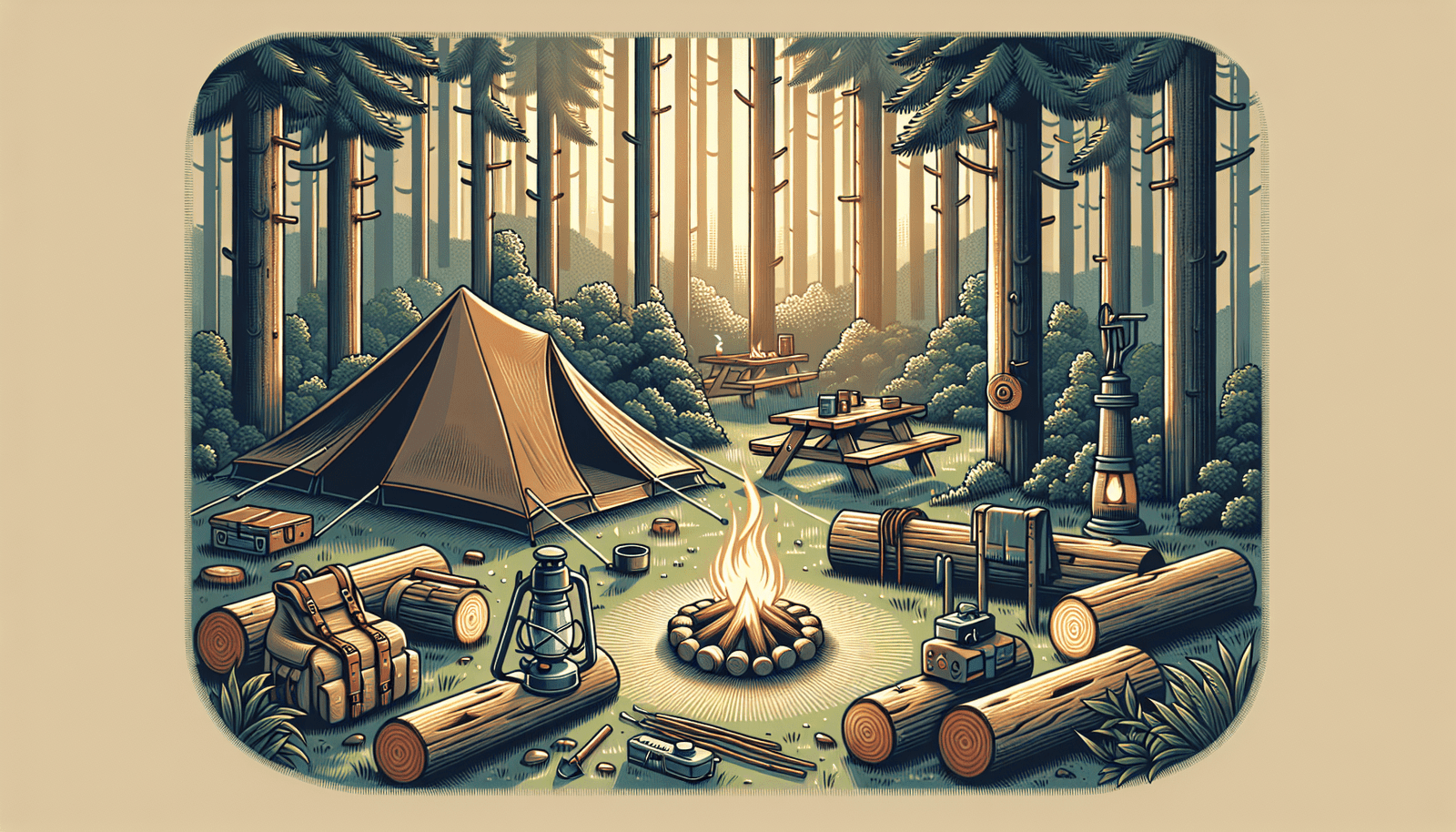Camping is an adventure that brings you closer to nature and offers a refreshing escape from everyday life. In “What Are Some Of The Do’s And Don’ts In Camping?”, you’ll discover essential tips to ensure your trip is both enjoyable and safe. From setting up your tent to respecting wildlife, this guide will help you navigate the great outdoors responsibly. You’ll learn practical advice on what to bring and actions to avoid, making your camping experience more memorable and hassle-free. Let’s set off on your camping journey with confidence and respect for the natural world around you!
What Are Some Of The Do’s And Don’ts In Camping?
Have you ever wondered what it truly takes to have an epic and trouble-free camping trip? Whether you are a seasoned camper or a newbie, there are always some do’s and don’ts that can make or break your outdoor adventure. To help you make the most out of your next trip into the wild, we’ve compiled both essential and lesser-known tips for a fantastic camping experience.
The Do’s of Camping
Let’s kick things off with what you should definitely be doing on your camping trip. These tips are designed to make your camping experience enjoyable, safe, and memorable.
Do: Plan Ahead
Proper planning can make all the difference between a smooth trip and a chaotic situation. Here are some things you should consider when planning:
- Research Your Destination: Know the terrain, weather conditions, and any regulations or permits required for the area.
- Prepare an Itinerary: Plan your activities but keep it flexible. You never know what you might discover once you’re there.
- Pack Wisely: Make sure you have a checklist of essential items such as a tent, sleeping bag, food supplies, and first aid kit.
Do: Choose the Right Gear
Your camping gear is your lifeline, so choose carefully:
- Tent: Ensure it is appropriate for the weather conditions and big enough for your group.
- Sleeping Bag: The right sleeping bag can make a world of difference in terms of comfort and warmth.
- Cooking Gear: Don’t forget portable stoves, cooking utensils, and biodegradable soap for cleaning up.
Do: Follow Leave No Trace Principles
Respect for nature should always be a priority. The Leave No Trace principles are guidelines to help you minimize your impact:
- Dispose of Waste Properly: Pack out what you pack in, and dispose of waste in designated areas.
- Respect Wildlife: Observe animals from a distance, and never feed them.
Do: Stay Safe
Your safety and that of your companions are paramount:
- First Aid Kit: Always have an up-to-date first aid kit that includes bandages, antiseptics, and any personal medications.
- Know Basic First Aid: Be prepared to handle common injuries or ailments like cuts, sprains, and insect bites.
- Awareness: Always be aware of your surroundings, including potential hazards like wildlife and uneven terrain.
Do: Engage in Activities
Camping is more fun when you fully immerse yourself in outdoor activities:
- Hiking: Explore the natural surroundings.
- Fishing: If permitted, fishing can be a relaxing and rewarding activity.
- Bonfires: Nothing beats the good old campfire stories and marshmallow roasting.
The Don’ts of Camping
Now, let’s delve into what you should avoid doing while camping. These tips will help you steer clear of common pitfalls.
Don’t: Ignore Weather Warnings
Ignoring weather conditions can lead to disastrous situations:
- Check Forecasts: Regularly check the weather forecast before and during your trip.
- Avoid Extreme Conditions: Postpone your trip if severe weather is predicted.
Don’t: Overpack
Too much gear can weigh you down and make your trip less enjoyable:
- Essential Items Only: Stick to necessary items on your packing list.
- Avoid Redundancies: Don’t bring multiple items that serve the same purpose unless it is absolutely necessary.
Don’t: Disturb Nature
Respect the natural environment:
- Stay on Trails: Straying from marked trails can harm the surrounding flora and fauna.
- No Loud Noises: Avoid making excessive noise that can disturb wildlife and other campers.
Don’t: Underestimate Your Food Needs
Proper meal planning is crucial:
- Plan Your Meals: Have a day-by-day meal plan to ensure you have enough food for everyone.
- Non-Perishable Items: Opt for foods that don’t require refrigeration like canned goods, nuts, and dried fruits.
Don’t: Forget Personal Hygiene
Maintaining hygiene keeps you healthy and comfortable:
- Portable Toilets: In areas without facilities, consider bringing a portable toilet.
- Hand Sanitizer: Keep this handy for quick clean-ups.
- Shower Bags: Solar-heated shower bags can provide a semblance of comfort in remote locations.

Practical Tips for Common Camping Scenarios
Sometimes things happen that you might not plan for. Here are some practical tips to handle common camping scenarios:
Handling Emergencies
Emergencies can happen, and it’s best to be prepared:
- Emergency Contacts: Have a list of emergency contacts, including local emergency services.
- Backup Plans: Always have a backup plan for your planned routes and activities.
- Emergency Whistles and Flares: These can help signal for help if you get lost or hurt.
Managing Insect Bites and Stings
Insects are a given in the outdoors:
- Repellent: Use a good insect repellent.
- Clothing: Wear long sleeves and pants to minimize exposed skin.
- Aftercare: Have antihistamines and anti-itch creams in your first aid kit.
Water Purification
Access to clean drinking water is key:
- Boil Water: Boiling is the simplest method to purify water.
- Filtration Systems: Portable water filters can be a lifesaver.
- Purification Tablets: These are lightweight and effective.
Common Mistakes and How to Avoid Them
Learning from common novice mistakes can significantly improve your camping experience:
Mistake: Arriving Late
Arriving at your campsite late can throw off your entire schedule:
- Leave Early: Aim to arrive with plenty of daylight to set up camp.
- Setup Practice: Practice setting up your tent before your trip to make the process quicker.
Mistake: Forgetting Essentials
This can range from slightly inconvenient to trip-ruining:
- Checklist: Always refer to your packing checklist.
- Double-check: Before you leave, double-check all critical items like cooking gear, tent components, and emergency supplies.
Mistake: Poor Site Selection
A bad campsite can make for an uncomfortable stay:
- Level Ground: Choose flat ground to avoid water pooling in your tent.
- Safety Factors: Avoid areas with potential hazards like dead trees or low-lying areas prone to flooding.

Seasonal Camping Tips
Camping isn’t just a summer activity; there are specific tips for each season:
Spring Camping
- Mud: Be prepared for muddy conditions. Bring extra shoes.
- Emerging Wildlife: Be aware that animals are more active after winter.
Summer Camping
- Heat: Hydrate frequently and apply sunscreen.
- Mosquitoes: Summer means more bugs, so come prepared with repellent.
Fall Camping
- Falling Temperatures: Layer your clothing to adjust to fluctuating temperatures.
- Shorter Days: Plan your activities to make the most of daylight.
Winter Camping
- Insulation: Use a sleeping pad with good insulation.
- High-Calorie Foods: Keep energy levels high with calorie-dense foods.
Maintaining Your Equipment
Taking care of your gear ensures it lasts and performs well:
Tent Care
- Clean Regularly: Shake out debris and clean as needed.
- Dry Before Storage: Always ensure your tent is dry before packing it away to avoid mildew.
Sleeping Bag Maintenance
- Air It Out: Let it air out after trips to keep it fresh.
- Wash Sparingly: Use a specialized cleaning product when you do wash it.
Cooking Equipment
- Clean Thoroughly: Clean all cooking utensils and stoves immediately after use.
- Inspect Before Use: Regularly check for damage or wear.
Conclusion
Camping offers a wonderful way to connect with nature and unwind from the stresses of daily life. By following these do’s and don’ts, you can ensure that your camping adventure is safe, enjoyable, and memorable. Preparation, respect for nature, and good hygiene are just a few principles that can help you make the most of your outdoor excursions. So, grab your gear, head into the great outdoors, and enjoy all the wonderful experiences that camping has to offer! Happy camping!
